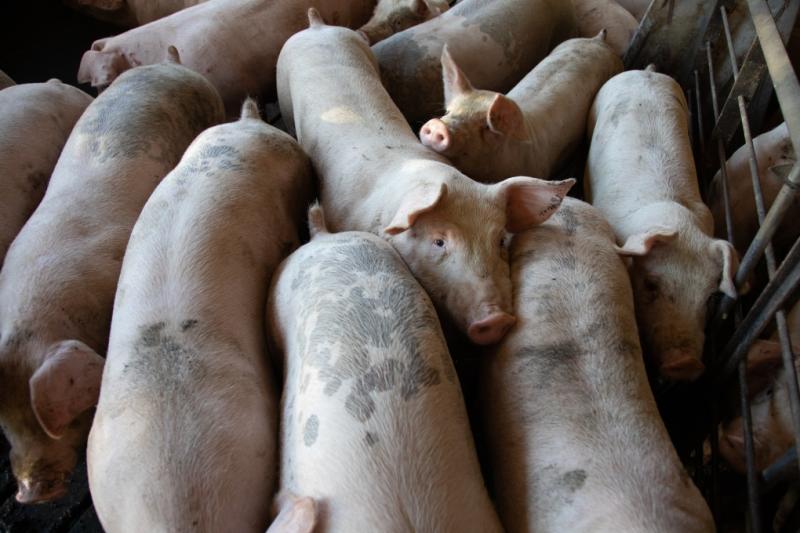Cut meat consumption by 75 per cent globally to tackle climate change: study
By: No Author Indicated

Cut meat consumption by 75 per cent globally to tackle climate change: study

If we want to save the world from climate change, we’re going to have to eat a lot less meat, experts say. In fact, according to a new report, while we don’t all need to become vegetarian, we do need to cut our global meat consumption by at least 75 per cent.
The demand for meat has been drastically increasing beyond the actual dietary needs of the human population for decades, researchers say, despite poor living conditions in factory farm settings and the meat industry’s huge impact on the environment.
“If all humans consumed as much meat as Europeans or North Americans, we would certainly miss the international climate targets and many ecosystems would collapse,” Prof. Dr. Matin Qaim of the University of Bonn, an author of the report, said in a press release.
“We therefore need to significantly reduce our meat consumption, ideally to 20 kilograms or less annually. The war in Ukraine and the resulting shortages in international markets for cereal grains also underline that less grain should be fed to animals in order to support food security.”
This new study, published online in the journal Annual Review of Resource Economics on Monday, looks at the economics of the meat industry as well as the cost and benefits to our bodies, societies and changing climate, concluding that there should be a significant reduction in how much meat we consume as a planet.
Consumption levels of meat are highest per capita in rich countries in North America, Oceania and Europe, the study said, and income and demographic projections suggest that the demand for meat is going to continue to increase until 2050. Eating an excess of meat can be unhealthy and promote chronic diseases, the study pointed out, but despite this, consumption seems unlikely to slow down.
It’s already well established that the production of meat has a huge impact on climate change, with meat production connected to significantly higher emissions than the production of plant-based foods, and also linked to increased deforestation and loss of biodiversity, the study’s authors suggested.
Cows are the biggest producer of greenhouse gas emissions of all livestock, producing more than ten times the amount of emissions per kg of product than the production of rice does, according to the study.
“Hence, further increasing meat production and consumption according to the trends described [earlier] would likely lead to the collapse of some global ecosystem functions on which humanity crucially depends,” the study suggests.
Farm animals also compete for food with humans to some extent — although the vast majority of food produced to feed to livestock is not capable of being consumed by humans (i.e., grasses, leaves, grains humans can’t digest), feed crops are grown on around 560 million hectares worldwide, which is 40 per cent of all the cropland available.
At present, around half of all grains produced worldwide are used as animal feed, Qaim said.
The study pointed out that around one-third of the cropland currently used to produce feed crops is capable of being converted into cropland to grow crops for human consumption.
GLOBAL VEGETARIANISM NOT NECESSARY, BUT SUSTAINABLE CONSUMPTION IS
Do we all have to transition to a fully plant-based diet?
No, the study says.
When environmentalists champion moving away from a meat-heavy diet, many people assume this means a strict directive to become vegetarian or vegan. It’s true that as an individual choice, transitioning to a vegetarian diet can be hugely beneficial for those who are able to, and the growing popularity of this lifestyle is helping to chip away at meat demand overall.
“From a mere climate perspective, vegetarian diets would be preferred over meat-based diets,” the study acknowledged.
However, it’s not feasible as a global solution. The study pointed out that there are regions where nothing but grassland can grow.
“We can’t live on grass, but ruminants can,” Dr. Martin Parlasca, co-author of the study, said in the release. “Therefore, if grassland cannot be used in any other way, it makes perfect sense to keep livestock on it.”
The study also pointed out that meat produced in “extensive grazing systems” have a much lower water footprint than meat produced in “intensive meat production systems,” or factory farming operations where large numbers of livestock are crowded into indoor facilities for the duration of their lives.
There are also many regions of the Earth where humans live that can’t grow plants with high-quality proteins and nutrients, or only grow them during a brief period of time that cannot totally sustain the population. These tend to be poorer regions.
“In such cases, animals are often a key element of a healthy diet,” Parlasca said. “For many people, they are also an important source of income.”
Livestock is responsible for around 40 per cent of the total agricultural production value, the study stated, with around 1.3 billion people employed in these production chains.
Raising farm animals also can have a powerful role in society — in some regions, owning livestock is one of the ways that women or poor households can achieve their own economic independence or opportunities.
“If the revenue from milk, eggs and meat is lost, this can threaten their livelihoods,” Parlasca said.
Efforts to reduce global meat consumption should take into account the socioeconomic benefits of raising livestock in low-income areas, researchers said, and instead target factory farming. The study points out that “industrial meat production systems have fewer positive effects on social equity in general,” clarifying that the big issue here is with large-scale meat production, not small farmers in poorer regions whose livestock are an integral part of their daily life, health and economic prospects.
The researchers suggest higher taxes on meat products in the countries in North America and Oceania as a way to help cut down on global meat consumption.
“That’s certainly unpopular, especially since a ten- or twenty-percent surcharge probably wouldn’t be enough, if it’s supposed to have a steering effect,” Qaim says. “Meat, however, has a high environmental cost that is not reflected in current prices. It would be entirely reasonable and fair to have consumers share more of these costs.”
They also mentioned that school curricula could be adjusted to include guidelines on “sustainable consumption” in order to raise the next generation with a better idea of how much meat should be part of their diet in order to keep global consumption at a reasonable level.
“We need to become more sensitive to the global impact of our decisions,” Qaim said. “This is true not only with food, but also with the shirt we buy at the discount store to wear for a single evening at a party.”




Comments are subject to the Confucius group RED BOX RULES which can be read by clicking on this link -> which will open the Confucius group home page, or by clicking on the Confucius group avatar at the top right of the article page above.
Critical political comments are off topic and will be deleted.
While cutting out all meat (protein) is a bit overkill, it makes very good sense (healthwise) to move more towards a fish and vegetables (and fewer carbs/salt/sugar/dairy) diet in contrast to a red meat / high carb / high salt / high sugar / high dairy / ... diet that is unfortunately so prevalent in the USA.
You probably have a very healthy diet given where you live and who does your cooking.
Have been gardening and canning fruits and veges for many years now.
Also harvest deer who think that they can eat my fruit trees without consequences.
Out here on the prairie it is eat or be eaten.
I'm sure glad I didn't "overkill" today, because my wife's niece came over and prepared the most tender delicious sweet & sour baby pork ribs lunch I ever ate in my life.
Only in my memories is cutting into a delicious tender rare filet mignon or a rib steak back in Toronto. Here the fare is more often rice or noodles, veggies and often but not always fish/seafood, fowl or pork, with lamb only during winter months occasionally. My wife grew up on a farm and she really knows her veggies. This Spring, for the first time during our marriage, she has staked out a small plot of public land within walking distance as many other Chinese people do, and is growing a crop of veggies. Scrap food items such as potato peels and even egg shells are now saved for compost.
These are visual examples of how some people here stake out and farm individual plots on public land, in photos I took beside and near a dam next to mountains within walking distance of our home.
I am a carnivore and shall remain so.
I don't intend to apologize to my grandchildren for their future world that I helped create today.
Consider myself to be an omnivore. Most humans are.